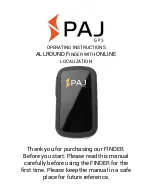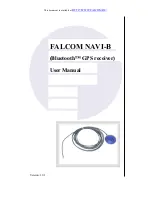
9
5.0 NMEA Protocol
NMEA Commands
This chapter describes the supported NMEA commands.
5.1 General NMEA Commands
The following sections introduces
the
general-purpose NMEA commands the basic PCM3292
operations.
5.1.1 START – Start Navigation
Commands PCM3292 to start navigation. The command has no effect if called while
PCM3292 is already navigating. After the start command has been given, it takes some time
for PCM3292 to acquire satellites, gather data from the signal and calculate a first fix.
$PFST,START,<startmode>
<start mode>
Navigation start modes:
0=Autostart. Always uses the fastest possible start mode (1-4). Default
value.
1=Force cold start. Module will behave as if no valid ephemeris or PVT
data were available.
2=Request warm start.
3=Request hot start. Requires RTC time, valid ephemeris and PT data.
Calculates a fix as soon as PS time is acquired from the GPS signal.
4=Request quick start. Requires RTC time and recent ephemeris.
Assumes that RTC time is very accurate and doesn’t wait for GPS
time.
Notice that if the host requests faster start mode than possible (e.g. hot
start when there is no ephemeris data available) start mode 0 will be
used.
RTC time is available if the module has already been navigating after
the previous power-up, or if the time has been given by using the
$PFST,INITAID command.
Valid ephemeris data is available if the module has been navigating
within the last two hours and the navigation has been stopped properly
by giving the $PFST,STOP command.










































